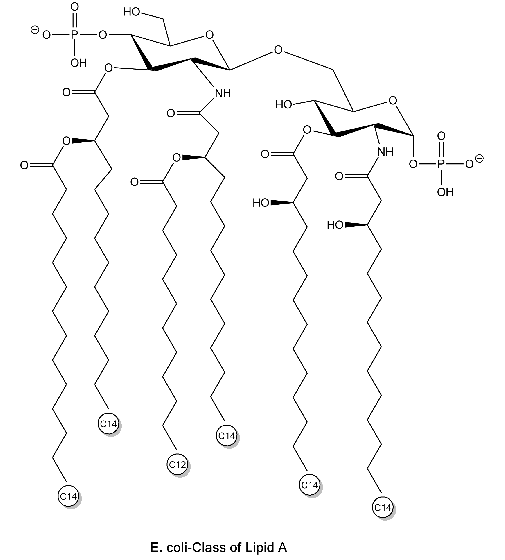Purity
>99.9%. No detectable DNA, RNA and protein traces.
Shipment
Ambient
Short Term Storage
+4°C
Long Term Storage
+4°C
Shelf Life
Stable for at least 2 years after receipt when stored at +4°C.
Description
Chemical. Isolated and purified from E. coli strain R515. Activation of cells by LPS is mediated by the Toll-like receptor 4 (TLR4), a member of the highly conserved protein family of TLRs, which are specialised in the recognition of microbial components. In mice, defects in TLR4 result in LPS unresponsiveness. For optimal interaction with LPS, TLR4 requires association with myeloid differentiation protein 2 (MD-2). According to current consensus activation of TLR4 is preceded by the transfer of LPS to membrane-bound (m) or soluble (s) CD14 by LPS-binding protein (LBP). This mechanism is believed to be generally true for LPS signaling. Re-form LPS and lipid A, but not S-form LPS, are capable of inducing TNF-alpha responses also in the absence of CD14. LPS, synthesized by most wild-type (WT) Gram-negative bacteria (S-form LPS), consists of three regions, the O-polysaccharide chain, which is made up of repeating oligosaccharide units, the core oligosaccharide and the lipid A, which harbors the endotoxic activity of the entire molecule. R-form LPS synthesized by the so-called rough (R) mutants of Gram-negative bacteria lacks the O-specific chain. Furthermore, the core-oligosaccharide may be present in different degrees of completion, depending on the class (Ra to Re) to which the mutant belongs. Monophosphoryl Lipid A (MPLA) represents a detoxified derivative of Lipid A and constitutes an important adjuvant in prophylactic and therapeutic vaccines.
ESCLUSIVAMENTE PER USO DI RICERCA (RUO) e non per uso terapeutico o diagnostico su uomini o animali. Il prodotto NON è un Dispositivo Medico o un Diagnostico in Vitro.
PRODUCT FOR RESEARCH USE ONLY (RUO) and not for therapeutic or diagnostic use on humans or animals. The product is NOT a Medical Device or an In-Vitro Diagnostic (IVD).





